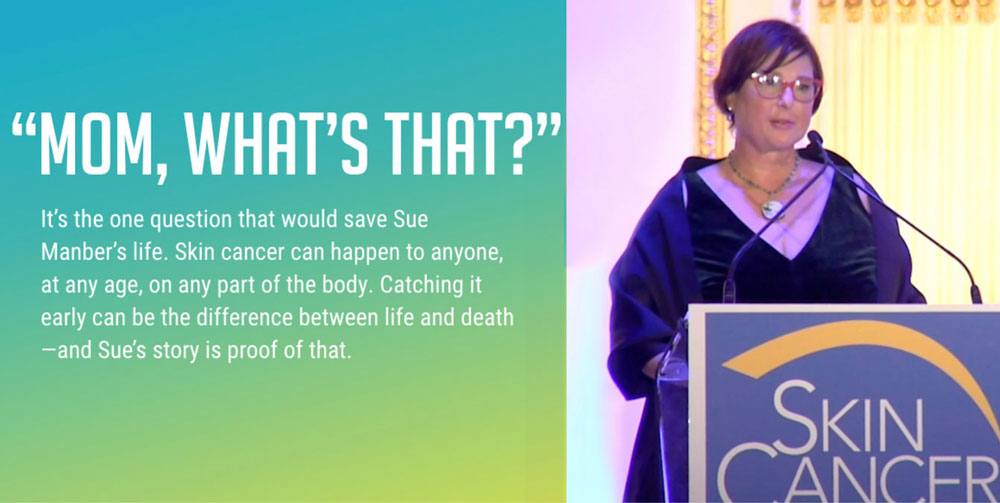Merkel Cell Carcinoma
Patient Support Center
Help for Patients & Caregivers
Welcome to the Merkel Cell Carcinoma (MCC) Patient Support Center. A diagnosis of MCC can be physically, emotionally and financially challenging. Because it is such a rare disease, you may be struggling to find reliable information and answers to the question: “What should I do next?”
You’re not alone. We’ve developed this support center to address the information gap around MCC, and help you find the answers you are looking for. Take a look at the Frequently Asked Questions below, and review the carefully curated list of videos, resources and support organizations that focus on guiding you through the challenges that arise during your diagnosis and treatment.
We realize that this is a difficult time. There is a lot of information to read and understand, and we are here to help guide the process. If you have any questions or concerns, please reach out to us at info@SkinCancer.org.
Frequently Asked Questions
Q: I’ve been diagnosed with MCC and I am very concerned. What should I do next?
A: First and foremost, while MCC is rare and dangerous, it is treatable. Due to a tremendous amount of work and research by dedicated health-care professionals, MCC treatment options and knowledge have surged.
What to do next:
The most important thing for you to do is to seek treatment at an academic center with specialized expertise in caring for people with MCC. Dermatologists, surgeons, medical oncologists and radiation oncologists need to confer to determine the best plan for a given case. It is important that they all understand the aggressiveness of MCC and all communicate with each other and you in a concise manner.
Q: How important is it to consider multidisciplinary care at a cancer center for MCC treatment?
A: “It’s so important, for several reasons. Depending on your sources of data, MCC is three to five times more deadly than melanoma, so it’s a serious diagnosis. And, due to its rarity, a lot of physicians are not familiar with the specific care that’s indicated. Updated information is not in many textbooks because MCC management has been so rapidly evolving over the past five to 10 years. Going to a place that truly offers expert multidisciplinary care is very important.” – Paul Nghiem, MD, PhD
Dr. Nghiem is director of the Skin Oncology Clinical Program at the Seattle Cancer Care Alliance and head of Dermatology at the University of Washington School of Medicine. Considered one of the foremost experts on MCC in the U.S., Dr. Nghiem has worked tirelessly to promote research and collaboration to create better outcomes for MCC patients.
Q: What do specialists advise about timing from diagnosis to treatment?
A: “When the diagnosis of MCC comes up, most doctors and patients quickly realize this is something to take seriously. MCC is aggressive and dangerous, and we certainly like to get people into evaluation, scans and treatment within, say, two weeks — to get a good plan and act on it. But it is important not to rush; get the facts before you jump.” – Paul Nghiem, MD, PhD
Q: What is the Merkel cell polyomavirus?
A: Evidence of the Merkel cell polyomavirus can be found in about 80 percent of Merkel cell tumors. The virus, discovered in 2008, lives in the skin of most people, without signs and symptoms, and without ever developing into MCC. Since the virus is common and MCC is extremely rare, scientists are uncertain about how or why the virus causes the disease in some people.
Your care team can identify whether the virus is the cause of your MCC by administering the AMERK biomarker blood test. The test is also administered at intervals to check for increases in antibodies, to help detect recurrences early, when the tumor will be more effectively treatable. Learn more here.
Q: How rare is MCC?
A: MCC is about 40 times more rare than melanoma. Each year in the U.S., approximately 3,000 new cases of MCC are diagnosed.
What Causes Merkel Cell Carcinoma?
“If your immune system is persistently suppressed, you are 15 times more likely to develop MCC.”
Sunandana Chandra, MD
Medical Oncologist
Northwestern University
Do MCC Patients Have a Higher Risk for COVID-19?
“MCC can be aggressive, and delaying treatment out of fear of the virus is likely not a viable option.”
Sunandana Chandra, MD
Medical Oncologist
Northwestern University
MCC Treatments
Dr. Inderjit Mehmi talks about Merkel cell carcinoma treatments.
Inderjit Mehmi, MD
Medical Oncologist
The Angeles Clinic and Research Institute
Cedars-Sinai
Dr. Mehmi talks about immunotherapy.
MCC Treatment Insights
“Exciting new therapies are emerging.”
Sandra D’Angelo, MD
Clinical Oncologist
Memorial Sloan-Kettering Cancer Center
Life after a Merkel Cell Diagnosis
Inderjit Mehmi, MD shares important insights about life after being diagnosed with MCC.
Inderjit Mehmi, MD
Medical Oncologist
The Angeles Clinic and Research Institute
Cedars-Sinai
Luis's MCC Journey
When Luis found out he had Merkel cell carcinoma, a rare form of skin cancer, he was determined to beat it. He shares his harrowing journey from diagnosis to treatment.
MCC Support Resources
MerkelCell.org
MerkelCell.org was created by physicians and researchers who work on MCC to answer frequently asked questions and provide accurate information about this disease.
Website: merkelcell.org
Email: mccteam@uw.edu
Patient resources: merkelcell.org/resources/patient-resources/
Find an MCC specialist: merkelcell.org/resources/find-a-specialist/
Patient Advocate Foundation
The Patient Advocate Foundation offers a fund for patients with MCC. Once approved, the fund provides one-time assistance of $450 to cover transportation-related expenses connected to treatment appointments. Eligible patients include those who are undergoing active treatment, have received treatment within the previous six months, or will be receiving treatment in the next 60 days. Each patient must meet household income guidelines and provide diagnosis documentation in order to finalize the application.
Website: www.patientadvocate.org/connect-with-services/financial-aid-funds/
Merkel Cell Carcinoma Seattle Support Group
This support group is a flexible, open discussion group located in Seattle, WA for anyone touched by Merkel cell carcinoma (MCC), including patients, spouses, family and friends. This is an informal opportunity to meet others coping with MCC, share stories and information, answer questions and provide support. They have first-hand knowledge and experience to share about treatments, clinical research trials and coping with MCC.
Website: sites.google.com/site/merkelcellcarcinomaseattle/home
MCC Treatment Centers in the U.S.
Arizona
- Mayo Clinic
Scottsdale, Arizona
Phone: 1.800.446.2279
Website: https://www.mayoclinic.org/departments-centers/merkel-cell-carcinoma-clinic/overview/ovc-20421781 - University of Arizona Cancer Center
Tucson, Arizona (also in Phoenix)
Phone: 520.694.2873
Website: https://cancercenter.arizona.edu/patients/research-disease-teams/melanomacutaneous-oncology
Arkansas
- University of Arkansas for Medical Sciences | Winthrop P Rockefeller Cancer Institute
Little Rock, Arkansas
Phone: 501.686.8275
Website: https://uamshealth.com/location/dermatology-cancer-clinic/
California
- John Wayne Cancer Institute at Providence St John’s Hospital
Santa Monica, CA
Phone: 310.829.8781
Website: https://www.saintjohnscancer.org/melanoma/conditions/merkel-cell-carcinoma/ - Scripps MD Anderson
La Jolla, California
Phone: 800.727.4777
Website: https://www.scripps.org/services/cancer-care/skin-cancer - UC Irvine Medical Center/Chao Comprehensive Cancer Center
Irvine, California
Phone: 949.824.0606
Website: http://www.ucihealth.org/medical-services/skin-cancer - USC Norris Comprehensive Cancer Center/Keck Medicine of USC
Los Angeles, CA
Phone: 800.872.2273
Website: https://cancer.keckmedicine.org/patients/cancer-programs/skin-cancer/ - Stanford Cancer Institute – Stanford Health Care Skin Cancer Program
Palo Alto, California
Phone: 650.498.6000
Website: https://stanfordhealthcare.org/medical-clinics/skin-cancer-program.html - University of California, San Francisco/Helen Diller Family Comprehensive Cancer Center
San Francisco, California
Phone: 415.353.7817
Website: https://www.ucsfhealth.org/clinics/melanoma-and-skin-cancer-program
Connecticut
- Smilow Cancer Hospital /Yale Cancer Center
New Haven, Connecticut
Phone: 203.200.6622
Website: https://www.yalecancercenter.org/patient/programs/melanoma/info/info/?id=CDR441548
District of Columbia/Washington DC
- MedStar Georgetown University Hospital
District of Columbia/Washington, DC
Phone: 202.444.2223
Website: https://www.medstargeorgetown.org/our-services/cancer-care/melanoma/melanoma-treatments/merkel-cell-carcinoma-treatment/ - The George Washington University Hospital/GW Cutaneous Oncology Program
District of Columbia/Washington DC
Phone: 202.741.2829
Website: https://cancercenter.gwu.edu/cancer-type-condition/merkel-cell-carcinoma
Florida
- Lee Moffitt Cancer Center
Tampa, Florida
Phone: 888.663.3488
Website: https://moffitt.org/cancers/Merkel-Cell-Carcinoma - Miami Cancer Institute
Miami, Florida
Phone: 786.596.2000
Website: https://baptisthealth.net/cancer-care/adultpatients/cancer-types/skin-cancers/merkel-cell-carcinoma/about - Sylvester Comprehensive Cancer Center / University of Miami Health System
Miami, Florida
Phone: 1.305.243.5302
Website: https://umiamihealth.org/sylvester-comprehensive-cancer-center/treatments-and-services/skin-cancers/melanoma-and-merkel-cell-carcinomas
Georgia
- Emory | Winship Cancer Institute
Atlanta, Georgia
Phone: 888.946.7447
Phone: 404.778.1900
Website: https://winshipcancer.emory.edu/patient-care/cancer-types/melanoma.html
Illinois
- Robert H. Lurie Comprehensive Cancer Center of Northwestern University
Chicago, Illinois
Phone: 312.695.0990
Website: https://www.cancer.northwestern.edu/types-of-cancer/skin/merkel-cell-carcinoma.html
Maryland
- Johns Hopkins Medical Center/Sidney Kimmel Comprehensive Cancer Center
Baltimore, Maryland
Phone: 410.464.6555
Website: https://www.hopkinsmedicine.org/health/conditions-and-diseases/merkel-cell-cancer - Mercy Medical Center/The Institute for Cancer Care
Baltimore, MD
Phone: 410.332.9294
Website: https://mdmercy.com/centers-of-excellence/cancer/melanoma-and-skin-cancer-center
Massachusetts
- Beth Israel Lahey Health/Lahey Hospital and Medical Center
Burlington, MA
Phone: 781.744.5115
Website: https://www.cancer.northwestern.edu/types-of-cancer/skin/merkel-cell-carcinoma.html - Massachusetts General Cancer Center
Boston, Massachusetts
Phone: 617.726.2914
Website: https://www.massgeneral.org/cancer-center/treatments-and-services/melanoma/merkel-cell-carcinoma/ - Dana-Farber/Brigham and Women’s Cancer Center
Boston, Massachusetts
Phone: 877.442.3324
Website: https://www.dana-farber.org/merkel-cell-carcinoma/our-approach/ - UMass Memorial Medical Center/Affiliation with Dana Farber
Worchester, MA
Website: https://www.umassmemorialhealthcare.org/umass-memorial-medical-center/services-treatments/cancer-care/cancers-we-treat/skin-cancer
Michigan
- UMichigan Medicine Rogel Cancer Center
Ann Arbor, Michigan
Phone: 734.936.6360
Website: https://www.uofmhealth.org/our-locations/rogel-cancer-center-multidisciplinary-cutaneous-oncology-clinic
Minnesota
- Mayo Clinic
Rochester, Minnesota
Phone: 507.538.3270
Website: https://www.mayoclinic.org/departments-centers/merkel-cell-carcinoma-clinic/overview/ovc-20421781
Missouri
- Siteman Cancer Center, Barnes-Jewish Hospital/Washington University School of Medicine
St. Louis, Missouri
Phone: 800.300.3606
Website: https://siteman.wustl.edu/treatment/cancer-types/skin/our-approach/
New Jersey
- Rutgers Cancer Institute of New Jersey
New Brunswick, New Jersey
Phone: 844.226.2376
Website: https://cinj.org/patient-care/melanoma-and-soft-tissue-oncology-program
New York
- Memorial Sloan Kettering Cancer Center
New York, New York
Phone: 800.525.2225
Website: https://www.mskcc.org/cancer-care/types/merkel-cell-carcinoma/merkel-cell-carcinoma-expert - Roswell Park Cancer Institute
Buffalo, NY
Phone: 1.800.767.9355
Website: https://www.roswellpark.org/cancer/skin/what-skin-cancer - University of Rochester/Wilmot Cancer Institute
Rochester, NY
Phone: 866.494.5668
Website: https://www.urmc.rochester.edu/cancer-institute/cancers/skin.aspx
Pennsylvania
- Fox Chase Cancer Center
Philadelphia, Pennsylvania
Phone: 888.369.2427
Website: https://www.foxchase.org/clinical-care/conditions/skin-cancer/treatment/nci-pdq-merkel-cell-carcinoma - Thomas Jefferson University Hospitals
Philadelphia, PA
Phone: 800.533.3669
Website: https://hospitals.jefferson.edu/diseases-and-conditions/merkel-cell-cancer.html
Oregon
- Oregon Health & Science University/ Knight Cancer Institute
Portland, Oregon
Phone: 503.418.3376
Website: https://www.ohsu.edu/knight-cancer-institute/skin-cancers-nonmelanoma
Ohio
- The Ohio State University Comprehensive Cancer Center – The James
Columbus, Ohio
Phone: 800.293.5066
Website: https://cancer.osu.edu/for-patients-and-caregivers/learn-about-cancers-and-treatments/cancers-conditions-and-treatment/cancer-types/skin-cancers/merkel-cell-carcinoma/screening-and-diagnosis - UH Cleveland Medical Center /Seidman Cancer Center
Cleveland, Ohio
Phone: 855.525.2225
Website: https://www.uhhospitals.org/services/cancer-services/skin-cancer/merkel-cell-carcinoma
North Carolina
- Duke University Medical Center
Durham, NC
Phone: 919.634.6205
Website: https://www.dukehealth.org/treatments/cancer/skin-cancers
Pennsylvania
- Fox Chase Cancer Center
Philadelphia, Pennsylvania
Phone: 888.369.2427
Website: https://www.foxchase.org/clinical-care/conditions/skin-cancer/treatment/nci-pdq-merkel-cell-carcinoma - Thomas Jefferson University Hospitals
Philadelphia, PA
Phone: 800.533.3669
Website: https://hospitals.jefferson.edu/diseases-and-conditions/merkel-cell-cancer.html
Tennessee
- Vanderbilt University Medical Center/Vanderbilt-Ingram Cancer Center
Nashville, TN
Phone: 615.936.8422
Website: https://vanderbilthealth.com/cancer/51376 - West Cancer Center & Research Institute
Memphis, TN
Phone: 901.683.0055
Website: https://westcancercenter.org/cancer-type/non-melanoma/
Texas
- Baylor Scott & White Charles A. Sammons Cancer Center/Baylor University Medical Center
Dallas, Texas
Phone: 844.279.3627
Website: https://www.bswhealth.com/specialties/cancer-care/cancers-treated/pages/skin-cancer-non-melanoma.aspx - Baylor St. Luke’s Medical Center/Dan L Duncan Comprehensive Cancer Center
Houston, Texas
Phone: 713.798.2262
Website: https://www.bcm.edu/healthcare/specialties/oncology/cancer-types/skin-cancers - UT Southwestern Simmons Comprehensive Cancer Center
Dallas, Texas
Phone: 214.645.8300
Website: https://utswmed.org/conditions-treatments/merkel-cell-carcinoma-mcc/ - UT MD Anderson Cancer Center
Houston, Texas 77030
Phone: 855.787.0063
Website: https://www.mdanderson.org/patients-family/diagnosis-treatment/care-centers-clinics/melanoma-skin-center.html
Utah
- University of Utah/Huntsman Cancer Institute
Salt Lake City, Utah
Phone: 800.824.2073
Website: https://healthcare.utah.edu/huntsmancancerinstitute/skin-cancer/
Virginia
- Inova Melanoma and Skin Cancer Center
Fairfax, Virginia
Phone: 571.472.4724
Website: https://www.inova.org/locations/inova-melanoma-and-skin-cancer-center
Washington
- Fred Hutchinson Cancer Research Center/Seattle Cancer Care Alliance
Seattle, Washington
Phone: 855.557.0555
Website: https://www.seattlecca.org/diseases/merkel-cell-carcinoma
Last updated: August 2022




